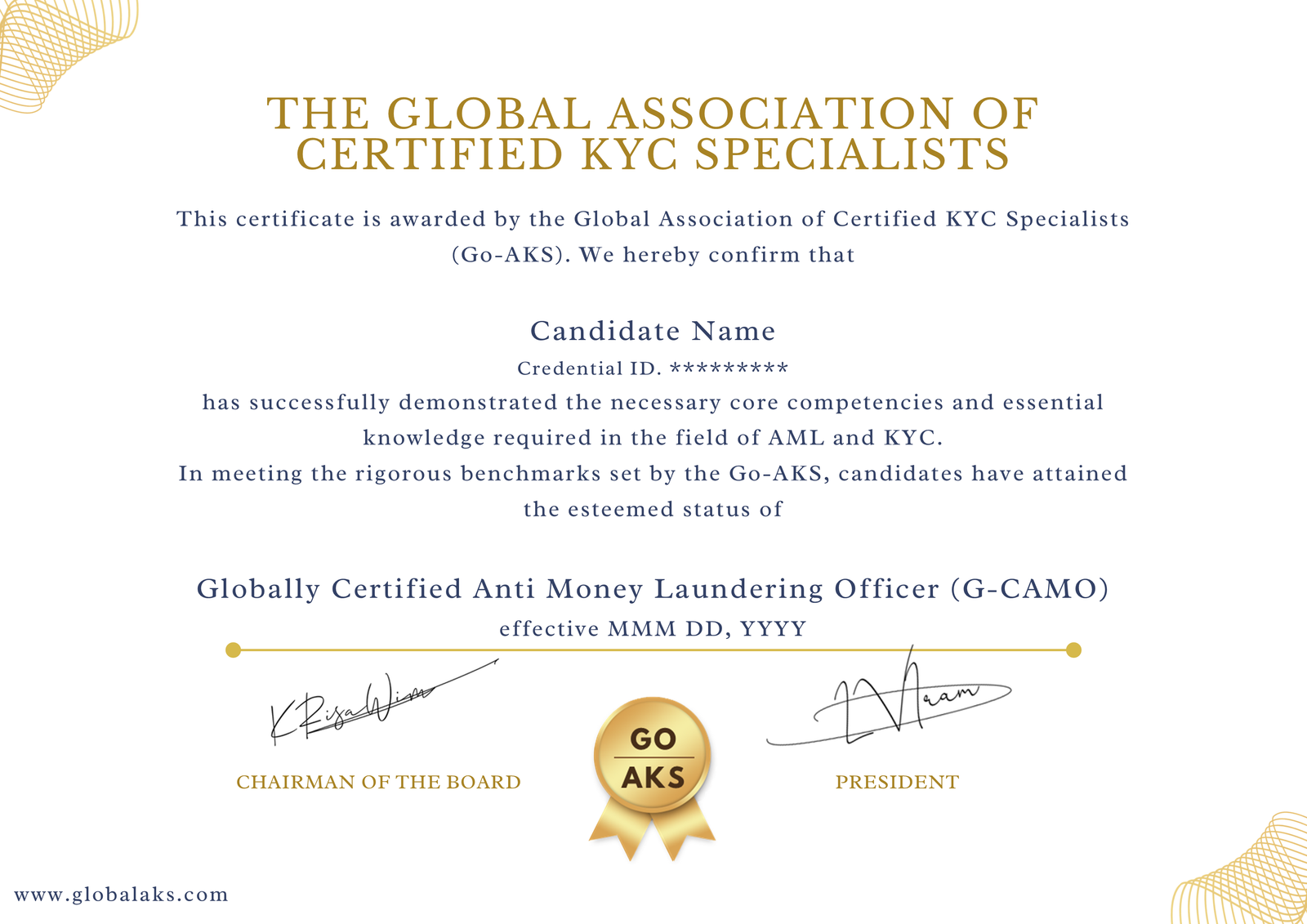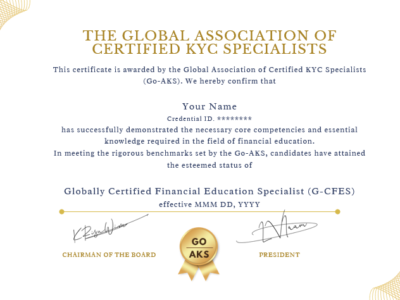
Overview
G-CAMO Certification Overview & Enrollment Details
The Globally Certified Anti-Money Laundering Officer (G-CAMO) certification is a globally recognized AML/KYC certification, awarded by the Global Association of Certified KYC Specialists (Go-AKS). Recognized in over 180 countries, it is considered the gold standard for AML professionals worldwide.
Designed to equip professionals with advanced expertise in AML compliance, financial crime detection, risk assessment, forensic investigations, and global regulatory frameworks, G-CAMO ensures compliance specialists stay ahead in the evolving financial crime landscape.
- Syllabus Overview – Last Updated: March, 2025
With a structured curriculum covering FATF guidelines, Basel Committee recommendations, EU AML directives, Middle Eastern AML frameworks, and emerging financial crime typologies, G-CAMO ensures that candidates develop a strong foundation in AML/CFT compliance and risk mitigation strategies.
For full details on the syllabus, download the G-CAMO Certification Guide & Official Syllabus from the Curriculum section below – available free of cost.
- High Demand for AML Professionals
The global financial landscape is experiencing a surge in money laundering, fraud, terrorist financing, and financial crime risks. Regulatory bodies worldwide are enforcing stricter AML/CFT compliance measures, making AML professionals more essential than ever in safeguarding financial institutions, fintech platforms, and multinational corporations.
With governments and financial regulators increasing anti-money laundering (AML) and counter-terrorist financing (CTF) scrutiny, there is a growing demand for skilled professionals who can navigate complex compliance landscapes, mitigate risks, and implement robust AML frameworks to prevent financial crime.
- Diverse Career Paths & High-Paying Roles
Earning the G-CAMO certification opens doors to prestigious and lucrative career opportunities in various sectors worldwide. Certified professionals are well-positioned for high-demand roles across banking, fintech, regulatory bodies, corporate firms, and law enforcement agencies.
- Career Growth & Future Prospects
🔹 Increased Employability – Gain a globally recognized AML certification and stand out in a competitive job market.
🔹 Higher Earning Potential – AML professionals command top-tier salaries due to rising demand for compliance related roles.
🔹 Global Career Flexibility – Work across banking, fintech, crypto, law enforcement, and regulatory sectors.
- Certification Enrollment Process
🔹 Enroll Online – Visit www.globalaks.com, select G-CAMO, add to cart, and complete payment for instant access.
🔹 Login & Access – Use your registered email and password to log in and access E-Book Download, Mock Tests, Final Exam
🔹 Study at Your Own Pace – Lifetime access with no deadlines.
🔹 Mock Tests – Two free attempts to prepare.
🔹 Final Exam – 90-minute online MCQ test, 85% required to pass, two free attempts, no negative marking.
🔹 Retakes – Additional final exam attempts available for $19 USD per retry.
- Download the Official G-CAMO Certification Guide & Syllabus
A detailed G-CAMO Enrolment Guide & Official Syllabus (PDF) is available in the curriculum section.
It includes:
-
Full syllabus breakdown
-
Accreditation details
-
Exam format & scoring
-
Career relevance
-
Renewal policy
-
Global industry alignment
Download the guide here: Click Here to download
The G-CAMO certification provides the knowledge, credibility, and recognition needed to excel in financial crime compliance, making you a valuable asset to any financial institution or regulatory agency.
For full details on the syllabus, download the G-CAMO Certification Guide & Official Syllabus from the Curriculum section below – available free of cost.
You will have continuous access to the learning materials, while your certification remains valid for two years. Renewal is required every two years at just 25% of the original fee. The materials are regularly updated with new topics, incorporating feedback from leading investment banks to ensure alignment with current industry standards.
Start your journey toward a rewarding AML career with G-CAMO today!
Course Features
- Lectures 3
- Quizzes 2
- Duration Lifetime access
- Skill level All levels
- Language English
- Students 28967
- Assessments Self
Curriculum
- 5 Sections
- 3 Lessons
- Lifetime
- G-CAMO Certification Guide & Official Syllabus (FREE)This guide provides a comprehensive overview of the G-CAMO certification, including the detailed syllabus, key topics, and learning objectives. It covers global AML/CFT frameworks, financial crime detection, risk assessment methodologies, and compliance best practices. Download this free resource to explore the full certification curriculum and enhance your expertise in AML compliance. Download now for free and take the first step toward mastering AML compliance!1
- G-CAMO : Study Material1
- Globally Certified Anti Money Laundering Officer (G-CAMO): Mock Test1
- Globally Certified Anti Money Laundering Officer (G-CAMO): Final Assessment1
- Certification Access1




